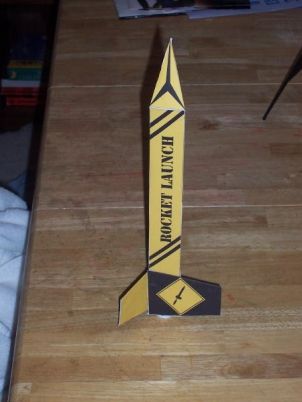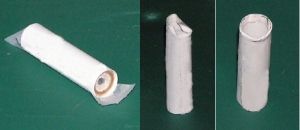| Construction Rating: | starstarstarstarstar |
| Flight Rating: | starstarstarstarstar_border |
| Overall Rating: | starstarstarstarstar |
| Manufacturer: | FlisKits  |
 Brief:
Brief:
This rocket is a single-staged, streamer recovery rocket that is made entirely
from cardstock. It's unique triangular body tube make this a Level 1 kit. Most
cardstock rockets require precise rolling and bending, making them too hard for
younger modelers. With only straight folds, this rocket can easily be done by a
small child.
Construction:
Everything you need to build this rocket prints on three sheets of 8.5" x
11" cardstock. The plans and instructions can be downloaded from the
FlisKits website.
Construction begins with cutting out the parts from the cardstock. Because of the clean design, I was able to cut it out completely with scissors instead of a knife. This is a plus for younger modelers. Scoring with a straightedge was easy since all the score lines were relatively short. I suspect that you could actually construct this model without scoring although the result might not be as clean.
Gluing the body tube is easy but since it is so long, you may wish to use a dowel or ruler to support the tab along the entire length as you adhere it to the opposite side.
The nose cone is also easy to form into a perfect point, since all the folds are straight. Attach the paper shoulder and it is finished.
The fins are very easy to construct since they are three layers of laminated card stock instead of a more complex origami-like 3D fold up. Be sure to press them under a flat weight (like a heavy book) since they will warp if you don't. After they are dry, attachment to the body tube is easy since the body tube is also flat surfaces.
The construction of the engine mount was unique. First, you actually wrap the mount around the casing twice, using tape to secure each wrap. In addition to making the tube easier to construct, it also prevents glue from oozing out and adhering the casing into the tube. Then instead of making a separate thrust ring, you simply fold and crimp the tube down in on itself, much like a roll of coins from the bank.
 Construction is finished with mounting of the shock cord and
streamer and the weighting of the nosecone, which I did with BBs and white
glue.
Construction is finished with mounting of the shock cord and
streamer and the weighting of the nosecone, which I did with BBs and white
glue.
Finishing:
Since the design is pre-printed, the only finishing suggested is a coat of
clearcoat. However, since blanks are provided, this rocket is infinitely
customizable.
Construction Rating: 5 out of 5
Flight:
I flew this rocket for the first time on a B4-2. It was the only B engine I had
left, and I judged the risk to the streamer to be low. After easily packing the
relatively large body tube with cellulose wadding and friction fitting the
engine, we were off to the pad. The flight was excellent, if unusual. At about
30', it began a very tight spiral which looked more like an aileron roll than
the corkscrew flight paths I have seen before. It was very cool and left an
interesting smoke trail. It was probably due to some sort of minor warpage of
the fins, but they look pretty flat to me so it may be a characteristic or
tendency of triangular designs. Ejection came at apogee with the nose still up
a bit but not by much.
Recovery:
The streamer worked properly and the rocket was recovered with no damage.
Flight Rating: 4 out of 5
Summary:
This is a great rocket at twice the price! Seriously, this is a great design
and I had a blast building it. I only subtracted 1/2 a flight point because
some purists might not like the corkscrew I saw, however, I personally liked
it.
Overall Rating: 5 out of 5
Other Reviews
- FlisKits Caution Rocket By Chan Stevens
Brief: This was a special edition of the standard Caution paper rocket, commemorating the 2004 National Sport Launch. I downloaded it from the NSL site that year, and have been waiting for the right occasion and motivation to build it. Thanks to the 2005 EMRR challenge, I found both on a "snow day" in mid December. Construction: This was a great little project to do in a ...
 |
 |
Flights
 |
 |
LU (March 5, 2007)
 |
 |
C.D.C. (July 2, 2004)